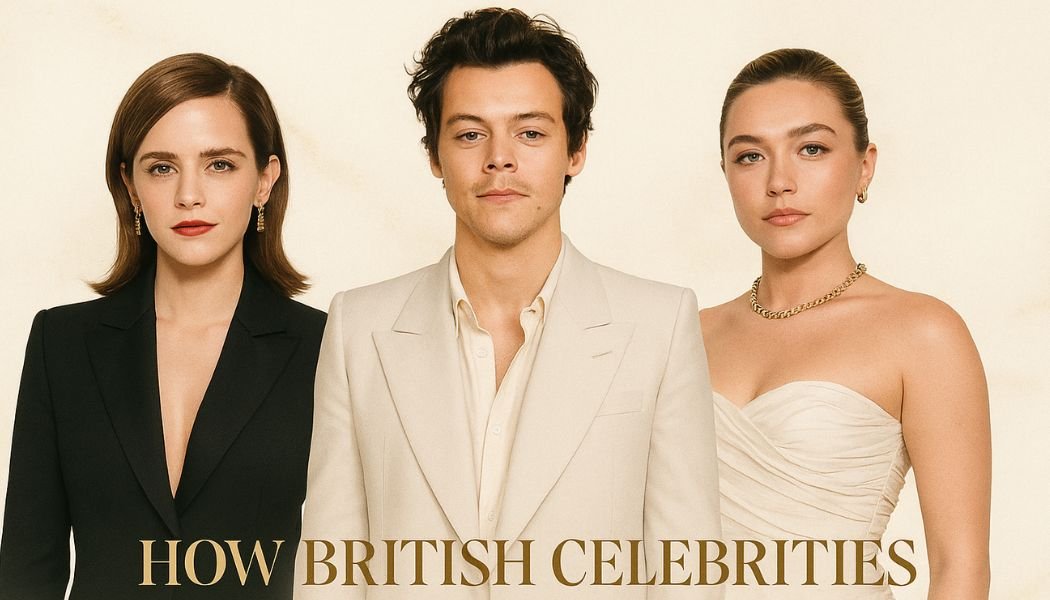Old luxury is out, authenticity is in.
Once upon a time, British luxury meant old-money mansions, stately Rolls-Royces, and couture so exclusive it was whispered about in Mayfair drawing rooms. Fast forward to 2025, and that polished, private version of opulence is being upended by a new generation of British celebrities, ones who believe luxury is about access, experience, and intention, not just excess.
From Emma Watson’s sustainable investments to Harry Styles’ gender-fluid fashion empire, Britain’s cultural icons are rewriting the playbook. Let’s unpack how they’re redefining luxury for a generation that values meaning as much as material.
The Evolution of British Glamour: From Stiff Collars to Soft Power
For decades, British luxury leaned on heritage, think Burberry trenches, Bentleys, and afternoon tea at The Ritz. But 2025’s celebrities aren’t interested in simply inheriting legacy; they’re reshaping it.
Take Florence Pugh. The Oscar-nominated actress has become a style revolution in herself, walking the red carpet in Valentino, yes, but pairing it with attitude and independence. Her message? “Luxury isn’t about perfection, it’s about expression.”
This sentiment echoes across British pop culture. Celebrities are moving away from showy displays of wealth and leaning into purpose-led prestige, quiet luxury, but with a conscience.
Sustainability Is the New Status Symbol
If the last few years proved anything, it’s that sustainability isn’t a trend, it’s the future currency of luxury.
Emma Watson, once the face of Chanel’s green initiatives, has now co-founded ethical ventures promoting circular fashion. Her wardrobe choices are tracked by fans and sustainability journalists alike, turning eco-awareness into an aspirational badge.
Similarly, Rosie Huntington-Whiteley has turned her beauty brand Rose Inc. into a symbol of “responsible glam.” Her sleek packaging, refillable components, and cruelty-free ethos speak directly to British consumers who expect their idols to care as much as they inspire.
Even Ed Sheeran, not the first name you’d associate with luxury, represents a kind of grounded British opulence. His Suffolk estate isn’t flaunted in tabloids; it’s quietly admired for its self-sufficiency and eco-design. In 2025, understatement is sophistication.
The Rise of Digital Aristocracy: Influence Meets Investment
The new generation of British celebrities is not just endorsing brands; they own them.
Harry Styles isn’t merely a musician anymore. His label, Pleasing, has evolved into a multimillion-pound lifestyle brand blending skincare, apparel, and gender-fluid beauty and it’s redefining what British cool looks like in the digital era.
Meanwhile, Maya Jama, the Love Island host turned business powerhouse, has mastered the art of cross-industry dominance. With collaborations across skincare, fashion, and spirits, Jama is part of a modern movement proving that influence, when leveraged with authenticity, is the new luxury asset.
And then there’s Stormzy, who turned his music money into community initiatives and tech investments. His version of luxury? Empowerment. “We’ve been taught luxury is exclusivity,” he told The Guardian. “I think real luxury is having the freedom to help others.”
Fashion Forward: Heritage Brands Meet Modern Icons
British heritage houses aren’t being left behind they’re evolving with their celebrity ambassadors.
In 2025, Burberry, under Daniel Lee’s creative direction, continues to embody modern British identity, blending streetwear energy with Savile Row craftsmanship. Celebrities like Dua Lipa and Naomi Scott have brought a global, youth-infused spark to these classic names, ensuring tradition stays relevant.
Meanwhile, Alexander McQueen’s bold new aesthetic has found favour among pop royalty. Charli XCX wore a custom McQueen gown to the Met Gala that went viral on TikTok within minutes, bridging couture and culture in a way that would make Lee McQueen himself proud.
Luxury Goes Emotional: The Feel-Good Factor
It’s not just what British celebrities are wearing or buying, it’s how they’re feeling.
The idea of emotional luxury wellness, mindfulness, and freedom has quietly overtaken materialism. Ellie Goulding’s shift from touring to environmental activism, Adele’s Las Vegas residency infused with vulnerability, and Zayn Malik’s creative retreat into art and fashion all point to one truth:
2025 luxury is deeply personal.
It’s about time affluence met authenticity.
The British public doesn’t envy the flash anymore; they admire the balance.
What This Means for the Future of British Culture
If America’s version of celebrity wealth still loves spectacle, Britain’s 2025 icons are choosing subtlety, a cultural sophistication that prizes artistry over algorithms.
This redefinition of luxury is also influencing how younger audiences view success. To Gen Z Brits, luxury is agency: the freedom to create, the courage to care, and the taste to curate a life that feels good, not just looks good.
And in that quiet revolution, the UK is leading the world.
🪶 Quick Takeaways
| Celebrity | Their Version of Luxury | Notable Brand/Initiative |
|---|---|---|
| Emma Watson | Sustainability & ethics | Good On You, Kering |
| Harry Styles | Gender-fluid beauty & design | Pleasing |
| Maya Jama | Influence & entrepreneurship | MIJ Masks, RAYE collaborations |
| Florence Pugh | Authentic fashion rebellion | Valentino, Tiffany & Co. |
| Stormzy | Empowerment & philanthropy | #Merky Foundation |
| Rosie Huntington-Whiteley | Conscious beauty | Rose Inc. |
The AmourVert.co.uk Perspective
British luxury has always carried a quiet confidence from tailored suits to tasteful understatement. But in 2025, it’s more than refinement; it’s redefinition.
Our icons are teaching the world that true luxury isn’t loud, it’s thoughtful.
And as new generations rise, perhaps that’s the most British thing of all.
Discover more on AmourVert.co.uk:
- Inside Salish Matter’s Rise to Fame From YouTube Kid to Gen Z Role Model
- Celebrity CEOs Who Built Empires Beyond Hollywood
- Gen Z Millionaires: The New Age of Digital Riches

